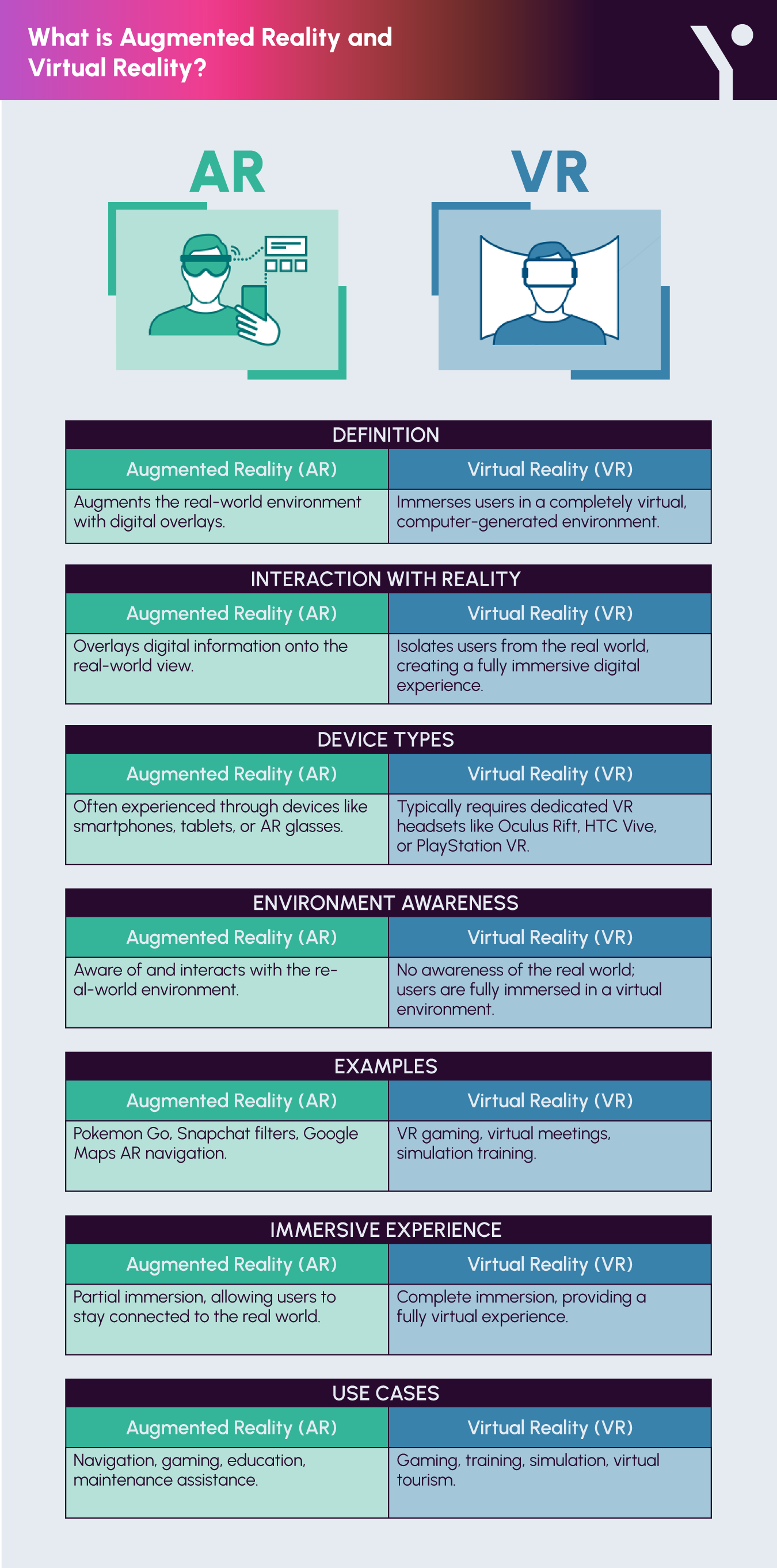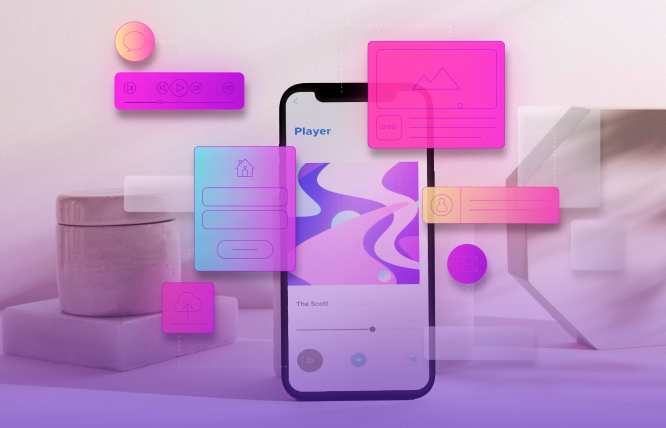Introduction
Organisations all over the world are taking augmented reality apps into consideration as they look towards innovating this process. The first mainstream use of AR was introduced when the real-world AR-based game “Pokémon Go” was released. People were flocking to the game and that was the first true exposure of AR to the public.
Organisations all over the world are taking augmented reality apps into consideration as they look towards innovating this process. The first mainstream use of AR was introduced when the real-world AR-based game “Pokémon Go” was released. People were flocking to the game and that was the first true exposure of AR to the public.
The growing market of augmented reality is making a drastic change in industries all over the world. In this article we will discuss
- What is AR and how it differs from VR
- How are industries using AR apps
- What benefits do companies enjoy by incorporating AR in their strategy
Organisations all over the world are taking augmented reality apps into consideration as they look towards innovating this process. The first mainstream use of AR was introduced when the real-world AR-based game “Pokémon Go” was released. People were flocking to the game and that was the first true exposure of AR to the public.
Over the years, AR has seen a rapid growth in the global market. According to studies, the global AR market went from USD 62.7 million in 2019 to an estimated growth of 28.6% CAGR, reaching USD 1849.8 million in 2025.
In this article we will discuss how AR is being incorporated in different industries, what an organisation needs to do to incorporate AR in their strategy and the benefits of introducing augmented reality apps.
What is Augmented Reality and Virtual Reality?
While AR and VR are used together in most cases, there are some clear differences between the two. The following infographic discusses the differences between the two technologies.

Impact of Augmented Reality Apps in Different Industries
Watching augmented reality apps grow from a mere video game to now being integrated in several industries goes to show its benefits. AR has already been incorporated in retail, entertainment, real estate and retail.
AR has already allowed several businesses tackle challenges and improve their revenue streams. Following are some of the industries that are already using AR for their operations.
Healthcare
Augmented reality in the healthcare industry is already creating new opportunities. Following are some of the ways AR has improved the healthcare industry.
- Augmented Diagnosis
Often, during the diagnosis process, a patient might not be able to describe their symptoms in a proper manner. Furthermore, there are often instances where patients must sit through pain because normal tests and finding veins for blood tests.
Certain devices and software allow doctors and nurses to project an AR scanner on the patient’s skin to find veins. This makes the process easier, quicker and less painful.
- Augmented Surgery
Surgeons can now access critical patient information in real-time and overlay the patient’s anatomy onto the body for precise surgical procedures. This enables a comprehensive visualisation of each body part, guaranteeing that adjacent organs are not negatively affected during surgery. This advancement contributes to a higher success rate in surgeries and reduces the recovery time for patients.
- Augmented Training and Practice
Augmented Reality (AR) apps offer medical students a realistic medical scenarios, prompting them to respond actively instead of relying on conventional training. This approach not only assesses the students’ knowledge and problem-solving abilities but also evaluates how well they manage stress and emotions during patient treatment.
Military
Augmented Reality (AR) is significantly impacting the military sector by enhancing the various aspects of operations. This technology is created a substantial change in the military industry.
In the military, AR plays an important role in preparing soldiers for battle, assisting in bomb disposal and handling explosive elements, and improving proficiency in using various weapons. AR adds informative labels to the real-world environment, enhancing navigation even in low-light conditions.
Entertainment
The entertainment industry is undergoing significant enhancements with the introduction of Augmented Reality (AR), influencing various subdomains such as music, live events, and movies.
- AR in the Music Industry
AR-powered earbuds and equipment add an augmented layer to real audio, providing users with a personalised listening experience tailored to negate background sound and create a true noise-cancelling experience.
- AR in Movies
AR benefits directors by seamlessly integrating unrealistic or non-existent elements, like dinosaurs, facilitating performances for dancers with physical disabilities, and incorporating various visual effects on the screen.
- AR in Media
Augmented reality elevates the impact of multimedia, games, videos, and presentations for a more engaging experience. It encourages interactive content sharing, resulting in better outcomes.
Real Estate
Augmented Reality (AR) has significantly improved the success rate and growth in the real estate industry by overcoming existing limitations and providing real estate experts with powerful tools. Some of the challenges addressed by AR include:
- Unappealing Text Descriptions
Traditional text descriptions of apartments often fail to engage potential buyers effectively. AR offers a more interactive experience, allowing users to visualise properties in 3D, resulting in higher engagement and conversion rates.
- Longer Decision-Making Time
2D photos may cause confusion for users trying to decide on whether the property meets their requirements. AR addresses this by presenting a 3D image that users can interact with, moving objects and assessing how the space meets their preferences.
In summary, AR in real estate improves engagement, accelerates decision-making, and provides a more immersive experience for potential buyers.
Manufacturing
The integration of custom mobile app development has played a vital role in improving the manufacturing industry and encouraging growth, introducing efficiency and improving customer experiences.
- Less Time Required for Manufacturing Processes
In manufacturing and supply chain management, locating specific objects or equipment can be time-consuming. AR addresses this challenge by adding virtual labels to objects, providing a 3D view of each element. This streamlines processes and significantly reduces the time required for task completion.
- Higher Customer Experience
AR-powered parcel service applications enable customers to track their shipments in real-time, from the warehouse to their doorstep. Additionally, these apps provide valuable product information, including size, weight, and price.
Retail
AR technology revolutionises the retail industry by enabling customers to virtually try products before making a purchase, creating immersive shopping experiences both in-store and online. Several retailers have embraced AR to enhance customer engagement:
- Sephora
Sephora’s app empowers customers to visualise how makeup products will look on them before buying, utilising AR to simulate the application of different cosmetic products.
- Wayfair
Wayfair allows customers to see how furniture will look in their homes. This feature aids in better decision-making for furniture purchases.
- Bentley
Bentley offers an AR visualiser app, providing users with the ability to explore the interior and exterior of their new SUV model.
Education
Augmented Reality (AR) has helped change the Education and Training industry, addressing various challenges faced by students and teachers:
- Difficulty in Conceptual Understanding
AR addresses conceptual understanding by providing a 3D model of objects, showcasing the complete concept in a 360-degree view. This experience helps bring a deeper knowledge and real-life implications.
- Short-Term Memory Retention
AR presents textual information visually, allowing users to virtually interact with content. This aids in memory processing, resulting in enhanced performance.
- Lack of Knowledge
AR offers a practical dimension to theoretical knowledge, enabling students and graduates to test their understanding in a virtual environment.
- Issues with Student Performance Evaluation
AR simplifies the task of educators by introducing virtual environments, allowing observation of their responses. This approach provides a better evaluation based on students’ performance rather than memorisation.
How To Integrate Augmented Reality into Your Business
While augmented reality apps is a great addition in your business, there are certain hurdles that businesses need to address before they can start implementing AR into their processes.
Market Research
Investing efforts in AR market analysis and competitive analysis is essential to understand what type of AR integration is best suited to your business and observe how this technology can help you establish a distinctive image in the marketplace.
Evaluate Challenges
While getting familiar with how others are making profits from AR, it is crucial to understand the limitations of your traditional business processes. That implies exploring the different segments of your business and bringing the individual teams on board to get a clear picture of what challenges they are facing.
Why Every Organisation Should Consider an AR Strategy
Once you have identified whether it is feasible for your organisation to incorporate AR into your strategy, you can move forward and enjoy the benefits it brings. These include:
Enhanced Customer Experience
Augmented reality applications can help improve customer experiences by offering a dynamic and interactive environment that boosts engagement and loyalty.
Increased Efficiency and Productivity
Industries like manufacturing, logistics, and healthcare can benefit from augmented reality apps by enhancing efficiency and productivity. Integrating digital information with actual equipment allows employees to work faster, with fewer errors, ultimately improving overall quality.
Competitive Advantage
AR provides a competitive edge by giving you an edge over your competition. Creating unique experiences with AR helps attract and retain customers, setting businesses apart in a crowded market.
Cost Savings
AR can lead to cost reductions by enabling remote operations, minimising the need for travel and on-site training. It also enhances supply chain efficiency by offering real-time visibility and tracking of inventory and shipments.
Innovation
AR serves as innovation on by providing a platform for experimentation and creativity, fostering a culture of continuous improvement and exploration.
Conclusion – Augmented Reality Apps
Augmented reality is making a difference in industries all over the world. With its countless features and growing market, businesses can benefit from incorporating augmented reality apps into their strategy.
Partner with FuturByte and our team of expert developers will help you harness the power of augmented reality, helping you create custom AR solutions for your business. Get a free consultation today!
Frequently Asked Questions
AR can improve customer experiences, increase efficiency in operations, provide a competitive advantage, lead to cost savings, and drive innovation across various industries.
Virtually any industry can benefit from AR, including retail, healthcare, manufacturing, education, entertainment, and more. AR solutions can be tailored to specific business needs.
AR in retail allows customers to visualise products in their real-world environment, enabling virtual try-ons, interactive product demonstrations, and a more engaging shopping experience.
Yes, AR can be seamlessly integrated into existing processes to enhance efficiency, productivity, and customer interactions. Custom AR app development ensures compatibility with specific business requirements.
Have questions or feedback?
Get in touch with us and we‘l get back to you and help as soon as we can!




